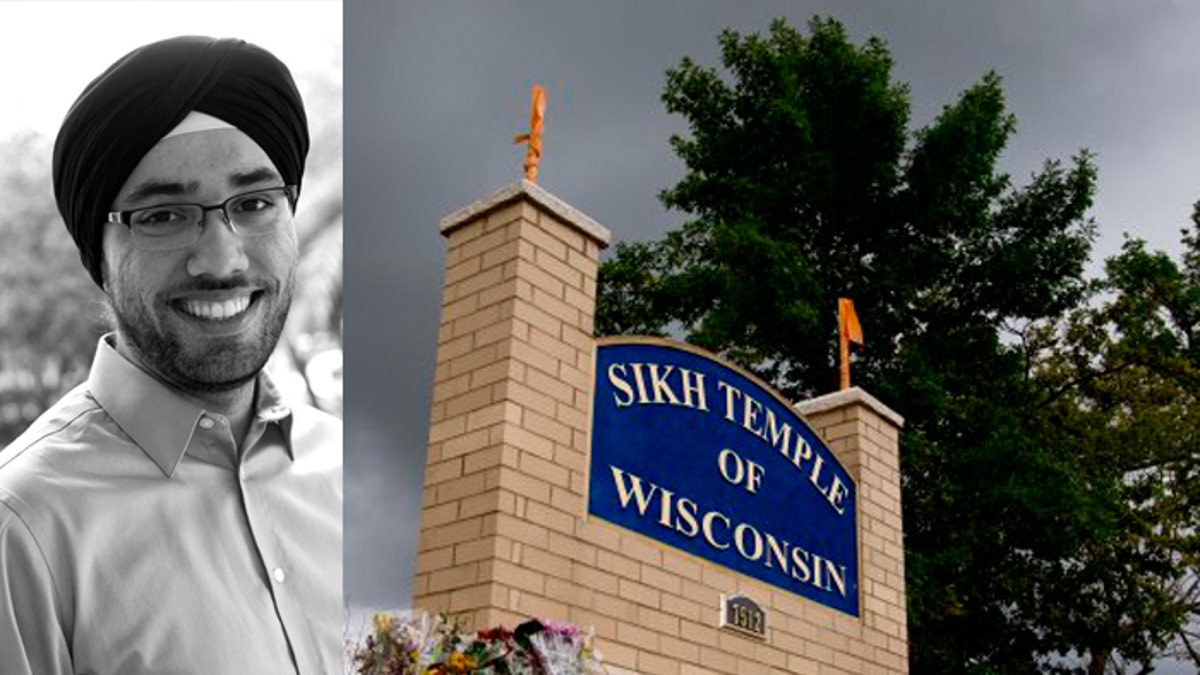
Sim Singh carried a legal gun even before the Wisconsin Sikh Temple massacre.
The Sikh temple massacre prompted calls for stricter gun control, but some members of the India-based faith -- who carry ceremonial knives -- are considering taking up firearms in light of the tragedy.
Sikhs are rattled after the horrific Aug. 5 shooting in Oak Creek, Wis., in which Wade Michael Page opened fire for no apparent reason before a police officer gunned him down. Although the religion teaches tolerance and good deeds, some believe arming themselves could be the best protection against hate crimes that have too frequently been perpetrated by assailants who mistake them for Muslims. Page's own motive is unclear, though he was a known white supremacist.
[pullquote]
“I think that being able to legally obtain and carry a gun is the best thing any Sikh can do, especially after 9/11 where there have been over 800 documented cases of harassment and violence against us,” Sim J. Singh, a practicing Sikh and Florida-based law clerk who carries a concealed handgun for protection, told FoxNews.com.
At a news conference after the shooting, New York City Mayor Michael Bloomberg, an ardent supporter of gun control, appeared with several Sikh leaders and called for stricter gun laws to stop such attacks in the future.
“Every day 34 Americans are murdered with guns,” Bloomberg said during a press conference with Sikh leaders. “The fact that criminals, terrorists and other mentally ill people have access to guns is a national crisis.”
But the Sikhs who spoke at the same press conference never mentioned gun laws. Sikhs are split about the issue, and some say that the Wisconsin tragedy has made them consider getting a permit to carry a gun for self-defense.
“The way the world is changing, I think I need to think about carrying a gun now,” Rajwinder Singh, the President of a Sikh Temple in Las Vegas, told FoxNews.com.
The Sikh religion requires males to carry a dagger -- known as a “Kirpan” -- for the protection of themselves and others, at all times.
“Our prophet said we should protect ourselves, and protect those who cannot defend themselves. He made sure that every [Sikh man] should carry a weapon,” Rajwinder Singh said.
He added that in the U.S., most Sikhs carry miniature Kirpans so as not to run afoul of state and local ordinances against knives. Where the laws are less strict, they often carry real weapons.
“In India, you see people carrying 10- inch, 11-inch Kirpans," Singh said. "That really can protect you if something happens.
“And now I know why my prophet says that I should carry a Kirpan. He saw that people should have some kind of protection.”
The president of the Sikh Temple of Wisconsin had only a butter knife on hand, which he used to fight the gunman. He was killed, but his heroic actions were credited for slowing the shooter. Guns were not allowed in the Sikh Temple of Wisconsin.
“No guns [were] allowed in the temple,” Kulbir Singh, an attendee of the Sikh Temple of Wisconsin, told FoxNews.com. “Everyone knows that it’s not allowed, anywhere in the temple.”
Still, some Sikhs support stricter gun laws in the hope that it will prevent dangerous people from getting guns. Sim J. Singh and Rajwinder Singh both said that reliable background checks and some limits on firepower seemed reasonable. Others went further.
“A gun can harm somebody. I never even think about owning a gun,” said Maninder Arora, a practicing Sikh in Hartford, Conn., who owns a Liberty Tax Services franchise.
“I know the gun lobby is strong. But at least they should put restrictions on the size of the gun, or the quantity of guns. My cousins -- they have 3 or 4 guns, which is not right,” he added, saying that he would rather put his faith in the legal system.
“We have a system where cops can arrive anywhere in a few minutes. In the [Wisconsin shooting] situation, the officer was there in about four minutes.”
Gurdev Singh Mann, the president of a Sikh temple in Renton, Wash., agreed about gun laws.
"Gun laws should be more strict. When giving guns to people, it's better if we check with a judge, look at their behavior and everything," he said.
Arora added that times have changed since carrying the Kirpan was mandated by the Sikh guru Gobind Singh in the year 1699.
“Carrying a Kirpan is part of our religion… if you think about our history… at that time it was a necessity for protection… the cops or the police were on horses. There was no telephone. Somebody had to run to where the officer was. But now, look at the technology. The way the technology is going, maybe the officers will soon be there in two minutes, rather than four minutes.”
Sim Singh, however, said that he personally carries a gun because he cannot rely on police arriving soon enough.
“Sometimes the police are not able to arrive in time,” Sim Singh said.
“I do not believe stronger gun control is the right solution, as it ends up hurting the law-abiding citizens from having the option to defend themselves with guns when necessary.”









































